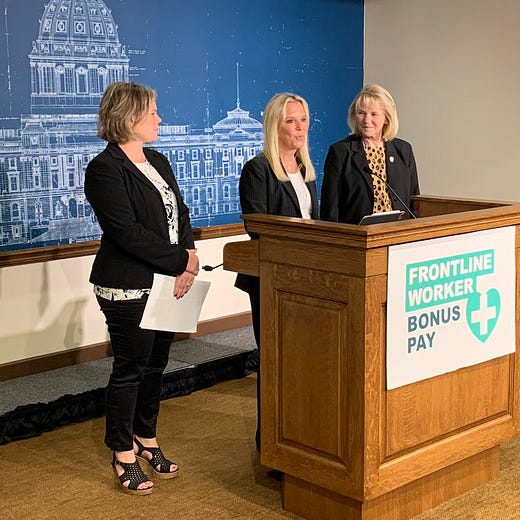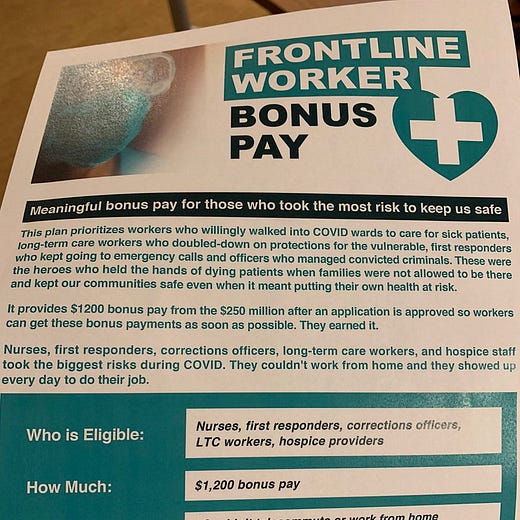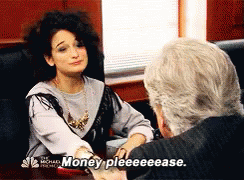Finally, a proposal for hero pay...
...that includes only nurses, first responders, corrections officers, and other long-term healthcare workers. Workers respond in solidarity and dismay.
Specifically including certain groups of workers means excluding other essential workers.
“I’ve been...just completely in the thick of this since the whole thing began,” said Rachel Hanneman, a nurse with the Minnesota Nurses Association. Hanneman worked at Bethesda hospital’s COVID-19 ICU unit before working at St. Joseph’s COVID-19 ICU unit in St. Paul. “I would leave my shift, go home, to the grocery store, grab Starbucks on the way home,” said Hanneman. “When you consider that people were using those environments, those grocery stores, retail markets, as almost a platform to go in and protest the mask mandates, they were deliberately bringing in those risks to those workers…I worked retail while I was in nursing school. I know how risky that could be. I got H1N1 and the flu in one season. These are not imagined risks.”

Senator Karin Housley, Representative Mary Kiffmeyer, and Representative Anne Neu Brindley of the Frontline Worker Pay Working Group, announced their proposal today for distributing the $250 million to frontline workers in Minnesota.
“This money was supposed to go to long-term caregivers and those essential workers that had sustained increased risk to COVID-19 exposure,” said Sen. Housley. “We heard some very heart wrenching stories. So many Minnesotans stepped up during the pandemic...a few groups really really stood out to us.”
Fernanda Acosta is a food service worker and organizer with Unidos Minnesota who tries to get people to understand the amount of exposure in food service. “Even if we wear masks, everyone else in the restaurant is unmasked,” said Acosta. “If you’ve ever been in a commercial kitchen, you’re gonna know it’s not necessarily built for comfort. There’s no space for us to be able to keep six-feet distance. A lot of us are immigrants, some documented, some undocumented, working multiple jobs to make ends meet, and of course having to risk ourselves and the lives of those that live with us. It continues to be frustrating that food workers as well as other non-frontline essential workers are left out of that essential work category.”
Broadening eligibility could mean a less meaningful amount. They took numbers from DEED on long-term caregivers and nursing homes in order to figure out the amount. They concluded $1200 would be meaningful.
For their proposal, the application process will be through DEED or the Department of Revenue, and the bonus pay would not be taxed by the state of Minnesota. Other requirements in the proposal include that a worker must have received less than one month of unemployment insurance, and they must have worked a minimum of 30 hours per week on average between March and December 2020.
The Minnesota Nurses Association has called for a more inclusive eligibility.
“Isn’t that amazing?” said Rep. Kiffmeyer, who is a nurse and has nurses in her family. “We’re gonna keep it from this group who had the highest risk put in day after day after day...and then say, if we can’t have it, everybody else, you can’t have anything.”
“We love our nurses...we certainly respect the Minnesota Nurses Association, but they don’t represent all nurses,” said Rep. Neu Brindley. “It’s our job to fight for nurses all across the state of Minnesota.”
Daniel Clute, a nurse at St. Joseph’s hospital, takes issue with that narrative. “We have worker solidarity for our brothers and sisters that are doing various jobs outside what’s included,” said Clute. “We must advocate for them.” He also noted that other efforts need to be made to address the current staffing crisis that the legislators acknowledged in the announcement.
Rep. Neu Brindley said that giving less money to more workers would feel like a bait and switch.
“The decision here is obvious,” said Rep. Neu Brindley. “There is a group of workers, those who worked in long-term care...these folks were assuming risk that other people just were not assuming. It behooves us as a legislature to acknowledge that.”
A few Democrat members of the working group tweeted out their thoughts after the announcement.
The Democrat members of the group, who want to widen eligibility for the hero pay, were not present for the announcement. Sen. Housley said the group should be gathering soon.
🤔 If my calculations are correct…
$250 million divided by $1200 means 208,333.333 workers could possibly receive hero pay.
Thoughts? What is a meaningful amount to you?
Remember to be kind to yourself. We are each other’s harvest.









